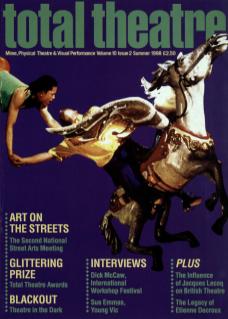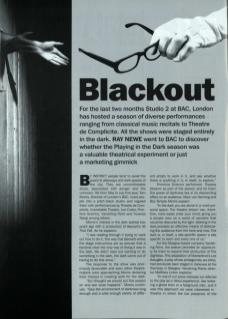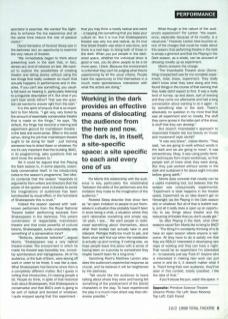By instinct people tend to avoid the poorly lit alleyways and dark spaces of the city. They are uncomfortable areas, associated with danger and the unknown. Yet from May to July this year, Tom Morris, Director of London's BAC, lured people into a pitch-black studio and regaled them with performances by Theatre de Complicite, Improbable Theatre, Ivor Cutler, Primitive Science, Vanishing Point and Fevered Sleep among others.
Morris' interest in the dark started two years ago with a production of Beckett's All That Fall. As he explains:
‘I was reading through it trying to work out how to do it. The way that Beckett writes the stage instructions are so precise that it became clear the only way of doing it was in the dark. We didn't start out wanting to do something in the dark, the dark came out of having to do this show.’
The response to the show was enormously favourable and soon other theatre-makers were approaching Morris declaring their interest in creating work for the dark.
‘So I thought we should put this season on and see what happens,’ Morris continues. ‘Give the environment of darkness long enough and a wide enough variety of different artists to work in it, and see whether there is anything in it, in itself, to explore.’
Primitive Science performed Theatre Dreams as part of the season and for them the power of darkness lies in its disorienting effect on an audience. Marc von Henning and Boz Temple Morris explain:
‘In the dark you are alone in a more personal space. The ‘theatre dream' can, therefore, more easily enter your mind; giving you a private view on a world of wonders that would be obscured by the light. Working in the dark provides an effective means of dislocating the audience from the here and now. The dark is, in itself, a site-specific space: a site specific to each and every one of us.’
For the Glasgow-based company Vanishing Point, the season provided an opportunity for them to expand their production of The Sightless. This adaptation of Maeterlinck's Les Aveugles, a play whose protagonists are blind, had previously been staged in darkness at the Tramway in Glasgow. Vanishing Points director Matthew Linton explains: ‘in one of our press releases we referred to the play as a “direct experience”, like “entering a ghost train or a fairground ride”, and it was this approach we were interested in – theatre in which the live presence of the spectator is essential. We wanted The Sightless to enhance the live experience and at the same time reduce the role of passive voyeur.’
David Harradine of Fevered Sleep saw in the darkness (sic) an opportunity to examine the very nature of theatre:
‘We immediately began to think about presenting work in the dark that, in fact, denies any kind of reliance on text. We wanted to explore the possibilities of creating theatre and telling stories without using the two things that really underpin so much that actually happens in performance and in theatres. If you can't see something, you usually fall back on hearing it, particularly listening to a linguistic description of it. But what if you can't hear words either? That was the question we wanted to answer right from the start.’
It is this spirit of enquiry that is so important to Tom Morris. ‘I get very, very bored by the amount of essentially conservative theatre that is made on the fringe,’ he says. ‘By default, the fringe has become a training and experiment ground for mainstream theatre – in the best and worst sense. Often in the worst sense, doing the job that mainstream theatre ought to be doing for itself – just training someone how to direct Ibsen or whatever. For me it's very important that this building [BAC], in its programming, asks questions that we don't know the answers to.’
Yet it could be argued that the Playing the Dark season is, in some aspects, essentially conservative itself. In his introductory notes to the season's programme, Tom Morris contends that the season ‘responds to arguments from writers and directors that the power of the spoken word in theatre to excite the imaginations of audiences has been bamboozled by visual effect. In the homeland of Shakespeare this is cruel.’
Indeed the season opened with ‘well-known performers from the Royal National Theatre stable’ performing excerpts from Shakespeare in the darkness. This potent combination of respectable mainstream theatre and that most powerful of cultural tokens, Shakespeare, surely unavoidably sets something of a conservative tone?
‘Bollocks, absolute bollocks!’ Argues Morris. ‘Shakespeare was a very radical theatre-maker. The environment in which he made his theatre was incredibly live, incredibly spontaneous and transgressive. All of his audience, or the bulk of them, were skiving off work in order to be there. It was like a rave. What Shakespeare has become since then is a completely different matter. But I guess in writing that introduction, I'm teasing people a bit. People do think, in spite of that historical truth about Shakespeare, that Shakespeare is conservative and that BAC's work is going to be sort of radical and devised or whatever. I quite enjoyed saying that this experiment – that you may think is totally radical and weird – is tapping into something that you base your culture on. But it is true that Shakespeare's theatre was very live and radical, as it's true that Greek theatre was when it was done, and there is a real logic to doing both of these in the dark. When you put people in the darkened space, whether the individual show is good or bad, you do allow people to be a lot more open, I think. Because the environment is unfamiliar they can't be judging what they're experiencing by all the usual criteria. People have the opportunity to find themselves in a much more spontaneous interaction with what the actors are doing.’
For Morris this relationship with the audience is key, particularly the relationship ‘between the skills of the performers and the invitation they make to the imagination of the audience’.
Fevered Sleep describe their show Yarn as ‘an open invitation to people to put themselves in a situation they probably haven't been in since being a child, a situation where they can't rationalise everything and simply say, “oh yeah, I see...”. We want people to rediscover something about themselves, about what their bodies can actually take in and interpret. Perhaps that's too much to ask, and that's what we'll find out when the installation is actually up and running. If nothing else, we hope people leave this piece with a sense of having been on a journey to somewhere they maybe haven't been for a long time.’
Vanishing Point's Matthew Lenton also sees the audience's experiential response as crucial, and he believes it will be heightened by the darkness.
‘We would like the audience to leave talking about where they were and having felt something of the predicament of the [blind] characters in the play. To have experienced the play in a much more direct way than otherwise possible.
Working in the dark provides an effective means of dislocating the audience from the here and now. The dark is, in itself, a site-specific space: a site specific to each and every one of us
What though is the nature of the audience's experience? For Lenton ‘the experience, especially because of its novelty, is a visual one’. However, Lenton here touches on one of the charges that could be made about this season; that performing theatre in the dark is simply a gimmick and that the Playing in the Dark season, as a whole, can be accused of dressing novelty up as experiment.
Morris answers the charge:
‘The Improbable Theatre show [Something Unexpected] was for me complete experiment, total, brave, experiment. They really didn't know what they were doing and they found things in the course of that evening that they really didn't expect to find. It was a really kind of bumpy, up and down, sort of evening and they came out afterwards and had a long conversation about wanting to do it again – to try something else in the dark. There's absolutely no question in my mind that that was all experiment and no novelty. The stuff they came across in the latter part of the show, is stuff that they can develop.’
But doesn't Improbable's approach to improvised theatre rely too heavily on ‘music and movement' style cliché?
‘It was very brave,’ insists Morris. ‘They said, “we are going to work without words in the dark and we are going to move”. It was extraordinary. Okay, it was using pretty familiar techniques from impro workshops, so that people sort of knew what they were doing. But they just worked without words in the dark and sustained it for about eight minutes before going adrift.’
Morris does concede that novelty can be a useful marketing tool, but believes that the season was unequivocally experimental. ‘Experiment is what happens in the theatre space. Experiment as an idea doesn't get on Newsnight (as the Playing in the Dark season did) or whatever. But all of that is bullshit really, and all it really does is open up an opportunity to say things about theatre and the resourcing of theatre that you don't usually get.’
So after Playing in the Dark, what other seasons would Tom Morris like to bring to BAC?
‘The thing I'm constantly thinking of is to have an open season where anyone is welcome. All they have to do is satisfy me that they are REALLY interested in developing new ways of working and they can have a night. That would be an experiment I'm interested in – to basically just say “Fuck it! Anyone who is interested in making new work can just come in and do it, it doesn't matter what it is.” They'll bring their own audience, they'll be seen in this context, totally unedited. I like the idea of that.’
If you'll excuse the pun, watch this space.


